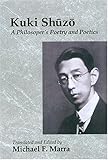Kuki Shuzo : A Philosopher's Poetry and Poetics / ed. by Michael F. Marra.
Material type: TextPublisher: Honolulu : University of Hawaii Press, [2004]Copyright date: ©2004Description: 1 online resource (376 p.)Content type:
TextPublisher: Honolulu : University of Hawaii Press, [2004]Copyright date: ©2004Description: 1 online resource (376 p.)Content type: - 9780824827557
- 9780824842345
- 181/.82 22
- PL810.U45 M27 2004
- online - DeGruyter
- Issued also in print.
| Item type | Current library | Call number | URL | Status | Notes | Barcode | |
|---|---|---|---|---|---|---|---|
 eBook
eBook
|
Biblioteca "Angelicum" Pont. Univ. S.Tommaso d'Aquino Nuvola online | online - DeGruyter (Browse shelf(Opens below)) | Online access | Not for loan (Accesso limitato) | Accesso per gli utenti autorizzati / Access for authorized users | (dgr)9780824842345 |
Browsing Biblioteca "Angelicum" Pont. Univ. S.Tommaso d'Aquino shelves, Shelving location: Nuvola online Close shelf browser (Hides shelf browser)

|

|

|

|

|

|

|
||
| online - DeGruyter Lost Generations : A Boy, a School, a Princess / | online - DeGruyter Be a Woman : Hayashi Fumiko and Modern Japanese Women's Literature / | online - DeGruyter Hawai‘i’s Russian Adventure : A New Look at Old History / | online - DeGruyter Kuki Shuzo : A Philosopher's Poetry and Poetics / | online - DeGruyter Identity and Ritual in a Japanese Diving Village : The Making and Becoming of Person and Place / | online - DeGruyter Spoken Hawaiian / | online - DeGruyter The Peopling of Hawaii : Second Edition / |
Frontmatter -- Contents -- Acknowledgments -- Introduction -- Worlds in Tension: An Essay on Kuki Shùzõ's Poetry and Poetics -- Free Verse [Shi] -- Short Poems (Tanka) -- Rhyming Poems: Poems Appended to Rhyme in Japanese Poetry -- The Genealogy of Feelings: A Guide to Poetry -- Selected Essays -- Notes -- Bibliography -- Index
restricted access online access with authorization star
http://purl.org/coar/access_right/c_16ec
Kuki Shûzô (1888-1941), one of Japan's most original thinkers of the twentieth century, is best known for his interpretations of Western Continental philosophy. His works on and of poetry are less well known but equally illuminating. During his eight years studying in Europe in the 1920s, Kuki spent time in Paris, where he wrote several collections of poetry and many short poems in the tanka style. Included in this volume are these Paris poems as well as other verses that Kuki appended to a long essay on poetry, "Rhymes in Japanese Poetry," written in 1931. Included as well are translations of two of Kuki's major critical essays on poetry, "The Genealogy of Feelings: A Guide to Poetry" (1938) and "The Metaphysics of Literature" (1940). Michael Marra, one of the West's foremost authorities on modern Japanese aesthetics, prefaces his translations with an important essay that gives an account of the current state of Kuki studies in English and presents an intriguing and original interpretation of Kuki's writings. Marra argues that there is an unresolved tension in Kuki's thought between a desire to overcome the rigid schemes of metaphysics, garnered from his knowledge of French and German philosophy, on the one hand, and a constant hesitation to let those schemes go, which is expressed in his verse.
Issued also in print.
Mode of access: Internet via World Wide Web.
In English.
Description based on online resource; title from PDF title page (publisher's Web site, viewed 02. Mrz 2022)


